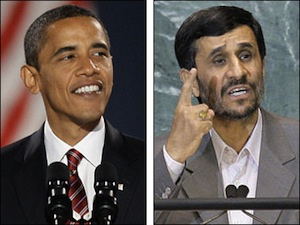The Strength of Obama’s Long Game With Iran

As Obama’s diplomatic game plan will take time to play out, I hope and believe he will convince Israel to avoid a precipitous use of force against Iran. It is unlikely, in my judgment, that either the U.S. or Israel will act militarily in 2011. Instead, it is far more probable that talks, sanctions, maneuvering at the UN and a build-up of force against Iran in the Persian Gulf will extend into 2012 and beyond.
Goldberg’s sober reporting spotlights a major strategic challenge for both the U.S. and Israel: the Iranian authorities are making a determined bid to become the dominant power in the Middle East. In fact, a government steered increasingly by the most hard-line elements of the Revolutionary Guard poses three distinct challenges to U.S and Israeli, as well as European and Arab, interests. First, Iran is seeking a nuclear weapons capability that would destabilize the current fragile pro-American balance of power in the region. Second, its funding and supplying of the most radical terrorist organizations -- Hezbollah, Hamas, Shia armed groups in Iraq, and others -- strikes directly at core American concerns. Third, Iran has done everything it can to thwart U.S. attempts to bring stability and peace to both Iraq and Afghanistan.
Israelis, especially, have reason and right to be concerned by these developments. Given the monstrous crimes committed against the Jewish people during the Second World War and Israel’s own subsequent bitter history, Prime Minister Netanyahu cannot ignore Iran’s direct threat to Israel. As its closest friend, the U.S. bears a special responsibility to help Israel prepare the most sensible and effective response.
There are two problems, however, with the argument senior Israelis put to Goldberg that Israel must take matters solely into its own hands. The first is Netanyahu’s characterization of the Iranian leadership as "a messianic, apocalyptic cult." That the current Iranian government is led by crude, cynical, objectionable, and dangerous men is clear. But there has been little in the behavior of Iran’s government since the Khomeini revolution more than 30 years ago that can be described accurately as messianic or apocalyptic.
More alarming is the drumbeat by some senior Israelis for a unilateral military strike as early as summer 2011. I have long believed the cost of such a decision would far outweigh its possible benefits and would be especially detrimental to the United States. As we learned so painfully in Iraq seven years ago, it is wise to contemplate the likely consequences of striking the first blow in such an incendiary environment. Iran would almost certainly respond quickly and with equal force. No one in the conspiratorially-minded Middle East would believe that Israel had acted without the consent of Washington, thereby dragging the U.S. into a wider conflict at a time when we are trying to exit Iraq and cope with an expanding Afghan war. An Israeli strike would be a propaganda boon for Tehran -- forcing Arab states currently hostile to Tehran to lend public support to the Ahmadinejad government. It would also lead almost certainly to asymmetric attacks against Israel by Hamas, Hezbollah, and others.
Can igniting such a conflict possibly be in the U.S. or Israeli interest? The answer is a clear no. The price is just too high.
The smarter alternative is for President Obama to trust his own instincts and to make clear to Netanyahu that the U.S., rather than Israel, will lead in the international response to the Iranian challenge
Since he took office, the president has believed that negotiations with Iran might possibly provide an escape from war for both countries. No U.S. administration since that of Jimmy Carter has had a sustained and serious discussion with the Iranian government. In the absence of any meaningful understanding of Iran’s motivations and objectives, it is sensible for the U.S. to test the proposition that talks might possibly lead to a better outcome than war. We lose nothing by agreeing, as the Obama Administration has been signaling in the last two weeks, to talks with Iran this autumn. And, we reinforce the possible success of such talks by imposing an ever tightening set of sanctions against Iran as the Obama team has done so skillfully this summer.
If negotiations and sanctions fail, as I fear they may, President Obama or his successor will ultimately have to make a brutally tough judgment: go to war to slow down Iran’s march toward a nuclear weapons future, or imprison Tehran in a vise of sanctions and military pressure -- containment -- without resort to open armed force
As Americans ponder this complex foreign policy challenge, we would do well to remember two essential truths about our struggle with Iran. The first is that it is more likely to be a marathon than a sprint. The second is that the U.S. is now and shall remain much more influential, purposeful, and powerful than the insular and cynical gang of retrogrades that make up the Ahmadinejad government. In my view, Obama’s patient, careful, and sophisticated policy makes much more sense for our country, as well as for Israelis, than an early resort to war by Israel that risks causing more problems than it resolves.
By: Nicholas Burns
http://www.theatlantic.com

